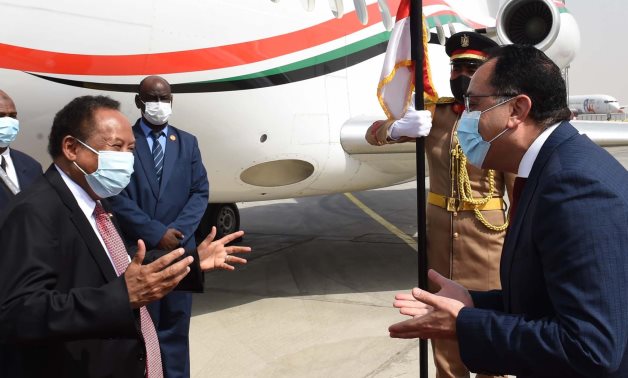
Egyptian Prime Minister Moustafa Madbouli receives his Sudanese counterpart Abdalla Hamdok who paid Egypt an official visit on Thursday- press photo
CAIRO – 11 March 2021: Egypt is not against the development of Ethiopia, but it should be in a way that does not harm the Egyptians and the Sudanese, said Egyptian Prime Minister Moustafa Madbouli in a press conference with his Sudanese counterpart Abdalla Hamdok on Thursday.
“We voice our concern about Ethiopia’s intention to fill the dam’s reservoir in the second year in a row without coordination with the two downstream countries [Egypt and Sudan],” said Madbouli, adding “We hope that our brothers in Ethiopia will respond to us in the coming period in a way that achieves the interests of the three nations.”
Egypt and Sudan have voiced their concern about the possible harms and threats of the controversial Grand Ethiopian Renaissance Dam (GERD) and how the dam will negatively after their water share of the Nile in case Ethiopia abstained from signing a binding and legal agreement on the dam operation and filling its reservoir.
President Al-Sisi confirmed Egypt's full support for Sudan’s government in all steps it takes for its economic reform, Madbouli affirmed.

During their bilateral meeting, both Prime Ministers tackled a number of projects between the two countries, including the electrical interconnection and railways projects. They also discussed other joint projects in irrigation and agriculture.
The Sudanese Prime Minister Abdullah Hamdok arrived at Cairo airport this morning, Thursday, in an official visit to Egypt, a high-level delegation that includes the ministers of Cabinet Affairs, Foreign Affairs, Finance and Economic Planning, Trade and Supply, Irrigation and Resources Water, transportation, investment and international cooperation, health, the Director of General Intelligence, and a number of other officials.

Hamdok’s visit comes in ligh of discussing ways to strengthen bilateral relations between the two countries in various fields.

During meeting with Armed Forces personnel, Tuesday, after the conclusion of the Martyr Day ceremony, President Abdel Fattah el Sisi said that Egypt and Sudan share a historical relation as old as the Nile River, and that both countries are keen on preserving their relations and to develop it.
He added that Sudan is currently going through a transitioning period in which Egypt will be supporting them in all possible ways.
Regarding the Ethipoian dam, Sisi said that Nile River is ‘life itself’ for both of Egypt and Sudan, so they are still calling on reaching a legal-binding agreement regarding the Renaissance Dam filling and operating.
Last week, Egypt’s President Abdel Fattah El-Sisi made a one-day visit to Sudan, during which he and the Sudanese leaders have affirmed rejection to Ethiopia’s unilateral plans to implement the second phase of the GERD filling whether or not an agreement among the three countries is reached.
Ethiopia has frequently affirmed it would implement the second filling of the Grand Ethiopian Renaissance Dam next July under any circumstances.
Egyptian Minister of Water Resources and Irrigation Mohamed Abdel-Atti said that Sudan worried because of what happened last year when Ethiopia began filling the dam reservoir without notifying Sudan, adding that Sudan was negatively affected.
In mid-July 2020, Ethiopian authorities unilaterally carried out the first phase of the filling process with 4.9 billion cubic meters; and it is expected that the second phase of the filling would reach 13 billion cubic meters in July.
The dispute among Egypt, Sudan, and Ethiopia dates back to May 2011 when Ethiopia started building the dam; Egypt voiced concern over its water share [55.5 billion cubic meters].
As Democratic Congo is chairing the AU for the year 2021, it is attempting to revive stalling negotiations between Egypt, Sudan, and Ethiopia. However, few hours before Sisi’s official visit to Sudan, Ethoipian Minister of Water, Irrigation and Energy Seleshi Bekele said on Thursday that his country is looking forward to a “win-win solution” for the Grand Ethiopian Renaissance Dam through trilateral negotiation.
Bekele’s remarks came after he hosted a delegation from the Democratic Republic of Congo to discuss the ongoing negotiations with Egypt and Sudan to reach a deal on GERD.
In 2015, the three countries signed the Declaration of Principles, per which the downstream countries should not be negatively affected by the construction of the dam.
In October 2019, Egypt blamed Addis Ababa for hindering a final agreement concerning a technical problem, calling for activating Article No. 10 of the Declaration of Principles, which stipulates that if the three countries could not find a solution to these disputes, they have to ask for mediation.
Washington had brokered tripartite negotiations among the three countries, in the presence of the President of the World Bank (WB) starting from November 6, 2019 until February 27 and 28, 2020.
During these rounds of talks, tangible outcomes were agreed on among the three parties concerning the rules and mechanism of operating the dam and the filling process of the reservoir during drought and prolonged drought; however, an agreement was not sealed.
Constructions in the Grand Renaissance Dam started on April 2, 2011 at a cost of $4.8 billion. The dam is located on the Blue Nile with a capacity of 74 billion cubic meters and is expected to generate up to 6,000 megawatts of power.
Comments
Leave a Comment